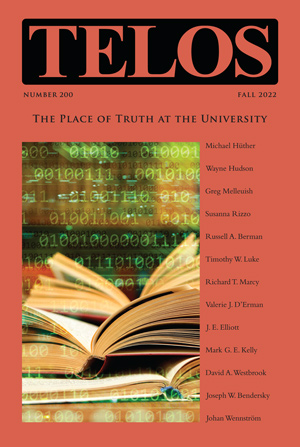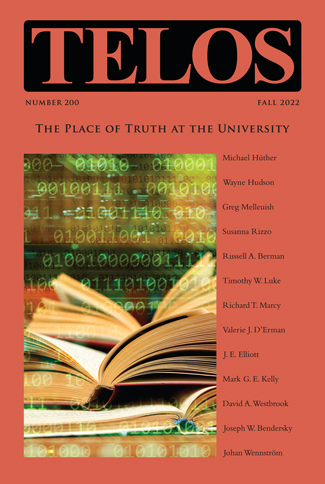By The Telos-Paul Piccone Institute · Wednesday, January 10, 2024  The first webinar in our yearlong series reckoning with the response to October 7 is available here. Panelists included Cary Nelson, Abe Silberstein, and Manuela Consonni. Their conversation was moderated by Israel initiative director Gabriel Noah Brahm. Eighty audience members heard their illuminating conversation, which provided a model of respectful engagement amidst disagreement, and many stayed for another hour for a casual, after-panel discussion. The first webinar in our yearlong series reckoning with the response to October 7 is available here. Panelists included Cary Nelson, Abe Silberstein, and Manuela Consonni. Their conversation was moderated by Israel initiative director Gabriel Noah Brahm. Eighty audience members heard their illuminating conversation, which provided a model of respectful engagement amidst disagreement, and many stayed for another hour for a casual, after-panel discussion.
The next webinar in the Israel webinar series will take place on Wednesday, February 7, at noon ET.
Continue reading →
By Telos Press · Wednesday, February 8, 2023 In today’s episode of the Telos Press Podcast, David Pan talks with David A. Westbrook about his article “From the Ivory Tower to the Football Stadium: A Rueful Response to Michael Hüther,” from Telos 200 (Fall 2022). An excerpt of the article appears here. In their conversation they discuss Michael Hüther’s claim that the decline of truth at the university is due to moralization and economization; the traditional conception of the university that forms the background for Hüther’s critique and the function it played in society; how the role and function of the university today is different from that earlier conception and the reasons for this shift; how has university research moved from being a form of science to a form of investment; the political function of the university today; whether the ideals of merit and inclusion contradict each other; and how the university compares to a church. If your university has an online subscription to Telos, you can read the full article at the Telos Online website. For non-subscribers, learn how your university can begin a subscription to Telos at our library recommendation page. Print copies of Telos 200 are available for purchase in our online store.
Continue reading →
By David Pan · Thursday, December 15, 2022  As the teaching assistant strike at the University of California extends into its fifth week, it seems that education has increasingly merged with activism. In fact, J. E. Elliott argues in our podcast interview that the development of the humanities in particular has moved so far in this direction that activism has become the explicit focus and attraction of majoring in the humanities for college students. As he lays out, such activist-oriented education is not a form of resistance but a result of the corporatization of the university, which involves not just links between corporations and universities but also the way in which college education has developed into a mass market commodity. The expansion of higher education, in promoting the admission of larger proportions of the population into college, has diluted the elite character of the college degree, making it into a more purely professional qualification and forcing colleges to devote more effort into justifying the value of their degrees for the job market. Because the ideals of inclusion and of merit are inherently contradictory, integrating more students into college has devalued the degree credential and therefore colleges must design their programs with an eye toward different segments of the higher education market. Consequently, the humanities at U.S. universities have evolved to establish “Brand English” to compete with “Brand STEM” and “Brand Business” by promoting social activism as its main distinguishing characteristic. As the teaching assistant strike at the University of California extends into its fifth week, it seems that education has increasingly merged with activism. In fact, J. E. Elliott argues in our podcast interview that the development of the humanities in particular has moved so far in this direction that activism has become the explicit focus and attraction of majoring in the humanities for college students. As he lays out, such activist-oriented education is not a form of resistance but a result of the corporatization of the university, which involves not just links between corporations and universities but also the way in which college education has developed into a mass market commodity. The expansion of higher education, in promoting the admission of larger proportions of the population into college, has diluted the elite character of the college degree, making it into a more purely professional qualification and forcing colleges to devote more effort into justifying the value of their degrees for the job market. Because the ideals of inclusion and of merit are inherently contradictory, integrating more students into college has devalued the degree credential and therefore colleges must design their programs with an eye toward different segments of the higher education market. Consequently, the humanities at U.S. universities have evolved to establish “Brand English” to compete with “Brand STEM” and “Brand Business” by promoting social activism as its main distinguishing characteristic.
Without the traditional literary and intellectual canons, the focus of humanities education has shifted toward promoting diversity, equity, and inclusion, which have become in many respects code words for identity politics, socialist-inspired redistribution, and college for all as entry into the job market. But because these three policies are partisan positions that have been enshrined as overarching truths (or in Elliott’s terms, “truth-posits”) for higher education, college humanities have to a large extent abandoned genuine debate about the origins and consequences of different ideas in favor of activist promotion of such ideas. The strike itself foregrounds the focus on equity without, however, considering the consequences of such a policy.
Continue reading →
By Telos Press · Wednesday, December 14, 2022 In today’s episode of the Telos Press Podcast, David Pan talks with J. E. Elliott about his article “Brand English and Its Discontents: Situating Truth and Value in the University Today,” from Telos 200 (Fall 2022). An excerpt of the article appears here. In their conversation they discuss how the pressure to commercialize university work has led to the creation of academic brands; how dissent has converged with commercialization at the university; why there is a conflict between meritocracy and inclusion, and how academic branding resolves it; how the peer review process has been undermined by academic branding; what a return to meritocratic values would look like; and why it is more appropriate to speak of truth-posits rather than truth as a goal of university work. If your university has an online subscription to Telos, you can read the full article at the Telos Online website. For non-subscribers, learn how your university can begin a subscription to Telos at our library recommendation page. Print copies of Telos 200 are available for purchase in our online store.
Continue reading →
By Telos Press · Wednesday, November 23, 2022 In today’s episode of the Telos Press Podcast, David Pan talks with Richard T. Marcy and Valerie J. D’Erman about their article “The Sensemaking and Construction of Political Narratives in Academic Settings,” from Telos 200 (Fall 2022). An excerpt of the article appears here. In their conversation they discuss Max Weber’s distinction between political advocacy and university teaching, and how this distinction is relevant for analyzing territorial acknowledgments; why the framework of narrative sensemaking is appropriate for analyzing territorial acknowledgments; the way in which territorial acknowledgments have developed through a process of sensebreaking, sensegiving, and senselocking; how the territorial acknowledgment represents a kind of truth in academia; Weber’s distinction between neutrality and objectivity and his argument that all research inevitably has some sort of value orientation; and how that value orientation should function in the university, particularly with regard to the university’s civic function. If your university has an online subscription to Telos, you can read the full article at the Telos Online website. For non-subscribers, learn how your university can begin a subscription to Telos at our library recommendation page. Print copies of Telos 200 are available for purchase in our online store.
Continue reading →
By David Pan · Monday, October 3, 2022 Telos 200 (Fall 2022): The Place of Truth at the University is now available for purchase in our store. Individual subscriptions to Telos are also available in both print and online formats.
 The place of truth at the university has always been elsewhere. Scientific conclusions are after all hypotheses, subject to continuing examination and critique in a process that forever defers the arrival at a final truth. In addition to this unbridgeable temporal distance from truth, there is a spatial distance to the extent that the university is subject to a larger purposive context that stands outside of scientific activity itself. A researcher can be objective by being non-prejudicial in collecting facts and weighing arguments but can never be neutral in terms of the goals of the research, which must always be established before the research begins and from outside of the research project itself.[1] Research cannot begin until an interest in some question has been expressed, and such an interest has generally not been up to the researcher to decide. Whether the goal of medical research will be to protect humans from a virus or attack humans with a virus will be determined by the sponsor of the research rather than the researcher, who at best may decline to take part in some forms of research. If the determiners of the goals of the university are not the professors themselves but the society that sponsors their work, it is within this external values framework that the truth of the university must be found. The place of truth at the university has always been elsewhere. Scientific conclusions are after all hypotheses, subject to continuing examination and critique in a process that forever defers the arrival at a final truth. In addition to this unbridgeable temporal distance from truth, there is a spatial distance to the extent that the university is subject to a larger purposive context that stands outside of scientific activity itself. A researcher can be objective by being non-prejudicial in collecting facts and weighing arguments but can never be neutral in terms of the goals of the research, which must always be established before the research begins and from outside of the research project itself.[1] Research cannot begin until an interest in some question has been expressed, and such an interest has generally not been up to the researcher to decide. Whether the goal of medical research will be to protect humans from a virus or attack humans with a virus will be determined by the sponsor of the research rather than the researcher, who at best may decline to take part in some forms of research. If the determiners of the goals of the university are not the professors themselves but the society that sponsors their work, it is within this external values framework that the truth of the university must be found.
Continue reading →
|
|
 The first webinar in our yearlong series reckoning with the response to October 7 is available here. Panelists included Cary Nelson, Abe Silberstein, and Manuela Consonni. Their conversation was moderated by Israel initiative director Gabriel Noah Brahm. Eighty audience members heard their illuminating conversation, which provided a model of respectful engagement amidst disagreement, and many stayed for another hour for a casual, after-panel discussion.
The first webinar in our yearlong series reckoning with the response to October 7 is available here. Panelists included Cary Nelson, Abe Silberstein, and Manuela Consonni. Their conversation was moderated by Israel initiative director Gabriel Noah Brahm. Eighty audience members heard their illuminating conversation, which provided a model of respectful engagement amidst disagreement, and many stayed for another hour for a casual, after-panel discussion. 



